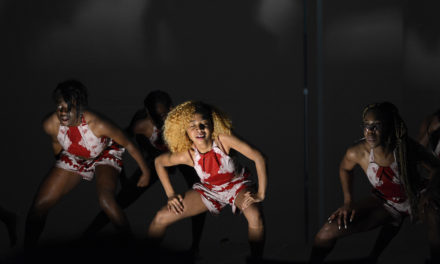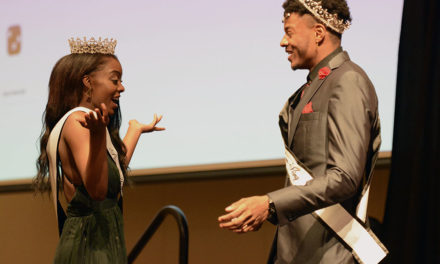Stephanie Tate| Editor-in-Chief
On Sep 29, 2016 students, faculty, sta and administrators alike gathered in Stew- art eatre for the second Racial Climate Town Hall. e town hall was planned by Student Government’s University A airs Chair Soraya Russell and is a part of a series of town halls planned by Russell and her committee members.
Russell, a junior studying international studies and nance, said that the biggest goal of the town hall was to “create a space where students can address their concerns to faculty, sta and administrators.”
This year, faculty members addressed the community rst as a follow up to action items presented at last year’s town hall.
Dr. Tracey Ray, Assistant Vice Provost for Student Diversity, spoke about a new diversity peer educators program called DEPTH. e program aims to discuss issues of diversity and inclusion on a peer to peer level and is a facet of the O ce for Institutional Equity and Diversity (OIED).
Ray also emphasized the presence of prayer spaces around campus, including the new interfaith prayer space that recently opened in Witherspoon Student Center.
Barbara Kirby, Associate Vice Provost of Academic Programs and Services spoke about the request for mandatory diversity courses for students as a part of the US Diversity requirement.
According to Kirby “U.S. Diversity GEP requirements have been a bit problematic for some time.”
Next, Deborah Felder from Student Involvement spoke on the mandatory diversity training for all registered student organizations. e training, entitled SOLE, requires that student organizations send representatives to participate or risk being unregistered in the following year.
Reggie Barnes, the new Directory of Campus University Centers, explained the concept of the Bias Incident Response Team (BIRT).
“If we call ourselves an inclusive and safe campus, we want to be able to provide evidence that is the case.” Barnes said. However, Barnes emphasized that
BIRT exists to act as an addition to not a detraction from other incident reporting processes.
The faculty presentation segment of the town hall ended with Beverly Williams, the Director of Training and Education in OIED who highlighted ongoing diversity training for faculty and sta .
The second portion of the town hall was geared towards allowing all those who attended to air their grievances with the general racial climate of campus. How- ever, most of the comments pertained to recent GroupMe messages that were made public via social media. ese messages contained racial slurs and other o ensive phrases.
Chancellor Woodson made an appear- ance a er not attending last year’s. Wood- son addressed the GroupMe messages with, “It was clear from the advice of the legal team and DASA that this did not reach that standard of violating student conduct.” Students audibly groaned at this statement.
The climax of the event occurred when Matt Smith, one of the students from one of the GroupMe messages spoke on behalf of the GroupMe “Enginerds 2020.” He remarked that the group was not overtly racist. is statement was met with yelling from the crowd.
Garrison Rountree, a junior studying Agricultural Business Management disagreed with the fact that the university could not punish the students.
“Going here is a privilege, not a right. Just like you can earn the privilege, you should be able to lose it” Rountree said.
If the crowd could agree on nothing else, they agreed on this as many people took to their feet to clap.





